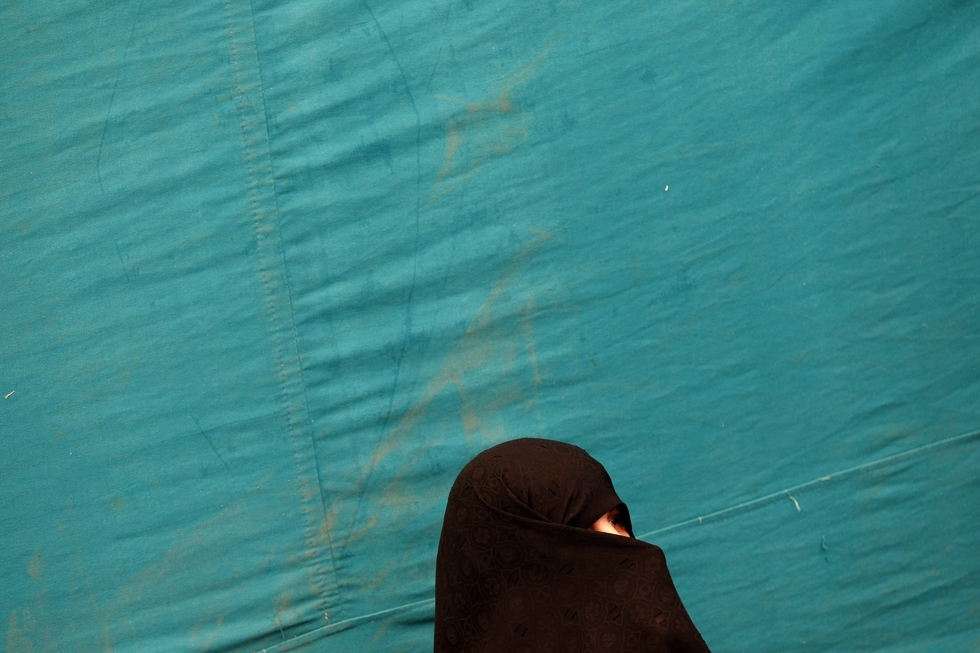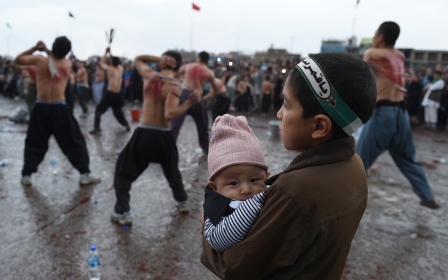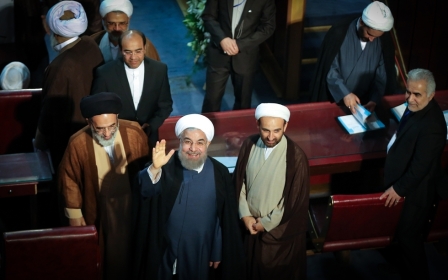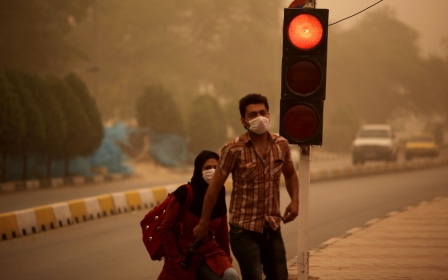Iran is what the Islamic State will look like if it succeeds

When people think about what horrifies them the most about the self-styled Islamic State (IS), surely a misnomer to end all misnomers, they usually point to its brutal violence, torture and sexual crimes, and how IS distorts the religion of Islam into something that is beyond all recognition to any normal Muslim.
But what frightens people more is what IS’s distortion of Islam would look like if it succeeded and actually became a state.
Allow me, then, to provide you with portents of the future if we fail to stop IS and the symptoms that created IS. If you want an inkling of what a "Caliphate" ruled by IS might look like, then look no further than Iran.
Comparison to Saudi Arabia
There have been some writers that have attempted to portray Saudi Arabia as IS in state form, but that is far from the truth. Although Saudi Arabia has done much that it needs to answer for, including supporting Abdel Fattah el-Sisi’s bloody coup in Egypt, working hand-in-glove with the US to destroy and invade Iraq, and stifling the rights of women and others, it pales in comparison to the fanatical Iranian theocracy.
Iran has an almost legendary reputation for distorting Islam. For instance, not too long ago it was reported that Iranian authorities had executed every single adult male in a village in Sistan and Baluchistan province for drug offences.
You read that correctly – every last man. Although drug offences, including smuggling, are no doubt serious crimes that are also punishable by death in other countries, the Iranian authorities did not once pay any mind or question as to why an entire village thought it had to resort to criminality to earn a living.
Had the Iranian government any regard to genuine Islamic teachings, they would have known that the close companion and friend of Prophet Muhammad, Caliph and Imam Umar bin al-Khattab, showed the world what balance and mercy in government meant when he utilised the Islamic principle of temporarily repealing punishments and prohibitions in dire circumstances.
This happened when the Muslims under Caliph Umar’s care were starving due to famine and were sometimes forced to steal to feed themselves and their families. Why did he do this? Because it is the responsibility of the state in Islam to make sure that its citizens are never placed in such a position in the first place, and thus they cannot be punished for trying to survive.
Organised terrorist attacks
IS goes to great lengths to convince Muslims that its path is righteous, and that Muslims the world over should join its cause. How is that any different from Iran who, since the days of Ayatollah Khomeini, has triggered wars, organised terrorist attacks and tried to assassinate the political leaders of other countries (for example, the Iran-sponsored 1980 assassination attempt on Iraq’s Tariq Aziz), and all in the name of "exporting the Islamic revolution"?
Let us not forget the Iranian Revolutionary Guard Corps’ (IRGC) Quds Force, a unit whose sole mission is to export the revolution and which is responsible for all of the IRGC’s extraterritorial operations, including the creation, funding, training and arming of paramilitary groups with a religious bent loyal to Supreme Leader Khamenei in Tehran.
General Qassem Soleimani is the Quds Force’s commander, and is notable as being the Iranian general that exercises command and control over sectarian Shia terrorist organisations in Iraq, Syria, Lebanon, Yemen and beyond. Soleimani was up until President Obama’s disastrous nuclear deal with Iran on a list of people sanctioned for terror activities.
Like the IRGC, IS also uses a system of loyalty, patronage and religious zealotry to recruit and subsume other militant groups to join its cause. One must only look to examples such as Boko Haram for evidence of this, and to understand that the IRGC operates in much the same way.
Iran's dealings with al-Qaeda and Taliban
This, however, should perhaps not be surprising at all considering that Wikileaks showed us links between Iran and IS’s predecessor, al-Qaeda in Iraq (AQI). In March 2016, a US court ordered Iran to pay compensations to 9/11 victims for Tehran's alleged role in aiding the al-Qaeda hijackers. Iran is even reportedly teaming up with the Taliban in Afghanistan against IS. All the while, Iran's client in Syria, the Assad government, continues to collude with IS, as the Arab nation faces its worse humanitarian crisis in modern times – thanks to Tehran.
From terrorism abroad to terrorism at home, Iran operates a judicial system that has overseen record breaking capital punishment figures, making Iran the world’s top executioner of juvenile offenders and as "the country which has the world’s highest per capita execution rate". In 2015 alone, Iran executed almost a thousand of its own citizens, second only to China, yet the world is oddly fixated by Saudi Arabia’s smaller execution record of 151 people.
Persecuted minorities
If that was not horrific enough, Iran actively persecutes the Kurdish and Baluchi Sunni minorities in both eastern and western Iran and forbids the construction of a single Sunni mosque in Tehran whilst having no problem at all with non-Muslims having their own places of worship. Even non-Persian Shia are under threat, such as the Ahwazi Arabs who have been brutally repressed and murdered by successive, racist Iranian leaderships, whether under the secular Shah or the religious zealot Khomeini and his successors.
There are many reports from human rights organisations such as Amnesty International and Human Rights Watch that attest to this fact, and yet we are ever so quick to pounce on the news that Saudi Arabia has executed this or that cleric, comparing them to IS, yet oddly silent as victims from ethnic and religious minorities are mechanically hoisted into the air by their necks via the use of cranes, and take up to 20 minutes to die painfully.
Shocking child marriages in Iran
Iran’s attitude to women is similarly frightening and very IS-like. In 2015, the UN reported that Iran had overseen the marriages of 48,580 girls aged between 10 and 14 in 2011 alone, and "in 2012, there were at least 1,537 girls under the age of 10" who were married off. Like IS, Iran seemingly has no problem with legalised paedophilia and the figures for just those periods alone is frightening, horrifying and despicable. However, the media focus is, again, usually on Saudi Arabia-IS comparisons.
Western governments encourage trade with Iran
To be clear once again, Saudi Arabia needs to be criticised and held to account. However, why are we so disproportionate when reporting on the countries of the region, electing to turn a blind eye to a state that murders like IS, encourages the rape of children like IS, persecutes ethnic and religious minorities like IS, and conducts international terrorism like IS? We criticise our governments for business dealings with Saudi Arabia who, let’s face it, is nowhere near as bad as Iran (it does not operate militias that scour the globe, for instance), yet say nothing when our governments encourage trade with the self-professed Islamic Republic.
By that logic, if Iran is good enough to trade with, IS is good enough to trade with, which is obviously a false logic that needs to be combated. The fact that we are even at the stage where we think dealing with Iran is a great idea whilst we bomb IS who are very similar demonstrates just how off-target we have been in combating terrorism, extremism and zealotry wherever we may find it.
- Tallha Abdulrazaq is a researcher at the University of Exeter's Strategy & Security Institute, and winner of the Al Jazeera Young Researcher Award. He blogs at thewarjournal.co.uk and tweets from @thewarjournal
The views expressed in this article belong to the author and do not necessarily reflect the editorial policy of Middle East Eye.
Photo: An Iranian woman covers her face while listening to the Friday prayers sermon at Tehran University on 3 July, 2009 (AFP).
This article is available in French on Middle East Eye French edition.
New MEE newsletter: Jerusalem Dispatch
Sign up to get the latest insights and analysis on Israel-Palestine, alongside Turkey Unpacked and other MEE newsletters
Middle East Eye delivers independent and unrivalled coverage and analysis of the Middle East, North Africa and beyond. To learn more about republishing this content and the associated fees, please fill out this form. More about MEE can be found here.





